JACQUES DERRIDA (19302004) was Directeur dtudes at the cole des hautes tudes en sciences sociales, Paris, and professor of humanities at the University of California, Irvine. He is the author of many books published by the Press, including Writing and Difference; Dissemination; and The Work of Mourning.
The University of Chicago Press, Chicago 60637
The University of Chicago Press, Ltd.,
London
2009 by The University of Chicago
All rights reserved. Published 2009
Printed in the United States of America
17 16 15 14 13 12 11 10 09 1 2 3 4 5
Originally published as Sminaire: La bte et le souverain,
Volume 1 (20012002). 2008 ditions Galile.
ISBN-13: 978-0-226-14428-3 (cloth)
ISBN-10: 0-226-14428-3 (cloth)
Library of Congress Cataloging-in-Publication Data
Derrida, Jacques.
[Bte et le souverain. English]
The beast and the sovereign / Jacques Derrida; translated by Geoffrey Bennington.
p. cm. (Seminars of Jacques Derrida; V. 1)
Translation of: Sminaire: la bte et le souverain.
ISBN-13: 978-0-226-14428-3 (cloth: alk. paper)
ISBN-10: 0-226-14428-3 (cloth: alk. paper)
1. Sovereignty. 2. Power (Social sciences)Philosophy. 3. Responsibility. 4. Capital punishment.
5. Perjury. I. Bennington, Geoffrey. II. Title. III. Series: Derrida, Jacques. Selections. English. 2009; V. I.
B2430.D483b4813 2009
194dc22 2009011389

The paper used in this publication meets the minimum requirements of the American National Standard for Information SciencesPermanence of Paper for Printed
Library Materials, ANSI Z39.48-1992.
E-book ISBN: 978-0-2261-4439-9
The Beast & the Sovereign
VOLUME 1

Jacques Derrida
Edited by Michel Lisse, Marie-Louise Mallet, and Ginette Michaud
Translated by Geoffrey Bennington

THE BEAST & THE SOVEREIGN
THE SEMINARS OF JACQUES DERRIDA
Edited by Geoffrey Bennington & Peggy Kamuf
FOREWORD TO THE ENGLISH EDITION
When the decision was made to edit and publish Jacques Derridas teaching lectures, there was little question that they would and should be translated into English. From early in his career, in 1968, and annually thereafter until 2003, Derrida regularly taught at U.S. universities. It was his custom to repeat for his American audience the lectures delivered to his students in France the same year. Teaching first at Johns Hopkins and then at Yale, he read the lectures in French as they had been written. But from 1987, when he began teaching at the University of California, Irvine, Derrida undertook to lecture in English, improvising on-the-spot translations of his French text. Recognizing that the greater part of his audience outside of France depended on translation was easier, however, than providing an ad libitum English version of his own elegant, complex, and idiomatic writing. In the circumstance, to his evident joy in teaching was often added a measure of suffering and regret for all that remained behind in the French original. It is to the memory of Derrida the teacher as well as to all his students past and still to come that we offer these English translations of The Seminars of Jacques Derrida.
The volumes in this series are translations of the original French editions published by ditions Galile, Paris, and will in each case follow shortly the publication of the corresponding French volume. The scope of the project, and the basic editorial principles followed in establishing the text, are outlined in the General Introduction to the French Edition, translated here. Editorial issues and decisions relating more specifically to this volume are addressed in an Editorial Note. Editors footnotes and other editorial interventions are, with a few exceptions, translated without modification, except in the case of footnoted citations of quoted material, which refer to extant English translations of the source as necessary. Additional translators notes have been kept to a minimum. To facilitate scholarly reference, the page numbers of the French edition are printed in the margin on the line at which the new page begins.
Translating Derrida is a notoriously difficult enterprise, and while the translator of each volume assumes full responsibility for the integrity of the translation, as series editors we have also reviewed the translations and sought to ensure a standard of accuracy and consistency across the volumes. Toward this end, in the first phase of work on the series, we have called upon the advice of other experienced translators of Derridas work into English and wish to thank them here: Pascale-Anne Brault, Michael Naas, Elizabeth Rottenberg, and David Wills.
Geoffrey Bennington
Peggy Kamuf
JANUARY 2009
GENERAL INTRODUCTION TO THE FRENCH EDITION
The complete edition of Jacques Derridas seminars and lectures will give the reader the chance of an unprecedented contact with the philosophers teaching voice. This edition will constitute a new part of his oeuvre, to be distinguished from the books and other texts published during his lifetime or revised by him before his death, and with a clearly different status. It is not certain that Jacques Derrida would have published the seminars as they stand: probably he would have reorganized or rewritten them. Taken as a whole, but also in their relation to Derridas philosophical oeuvre, these lectures and seminars will constitute an incomparable research tool and will, we believe, give a different experience of his thinking, here linked to his teaching, which was always, both in France and abroad, a truly vital resource of his writing.
The corpus we are preparing for publication is vast. From the beginning of his teaching career, Derrida was in the habit of completely writing out almost all his lectures and seminars. This means that we have at our disposal the equivalent of some fourteen thousand printed pages, or forty-three volumes, a very variable number of sessions (from one to fifteen) until 1964; what he always called seminars thereafter. Finallyand, no doubt, most relevantly for the editorial workaccording to the tools used: we have handwritten sessions from 1960 to 1970; type-scripts, with manuscript annotations and corrections, from 1970 to 1988; electronic files and printouts from 1988 to 2003.
Derridas seminars, years devoted to The Beast and the Sovereign (20013).
Jacques Derrida was in the habit of drawing on the abundant material of these seminars for the very numerous lectures he gave every year throughout the world, and often, via this route, parts of the seminars were reworked and published. Several of his books also find their point of departure in the work of the seminar: Of Grammatology (1967), for example, in large part develops sessions of the 196566 seminar on Nature, Culture, Writing; the seminar on Hegels Family (197172) is picked up in Glas (1974). Politics of Friendship (1994) is explicitly presented as the expansion of the first session of the 198889 seminar, and there are traces in it of other sessions too. But in spite of these partial convergences and correspondences, the vast majority of the pages written from week to week for the seminar remain unpublished and will provide an incomparable complement to the work already published. Whenever a session was later published by Jacques Derrida, in modified form or not, we will give the reference. We do not consider it appropriate for the edition of the seminars themselves, as original material, to offer a comparative reading of those versions.



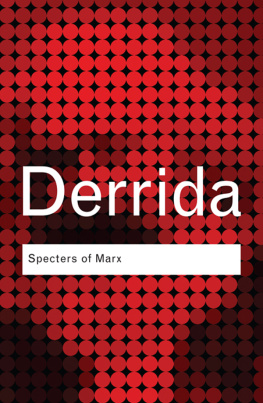


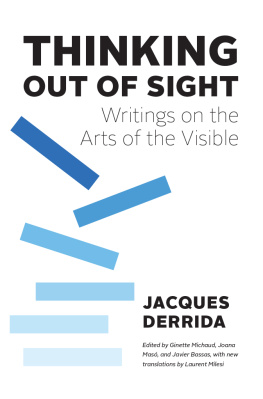




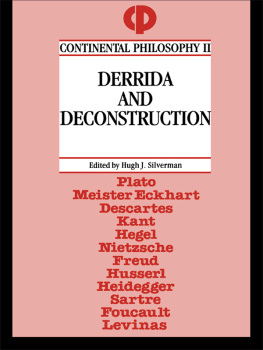

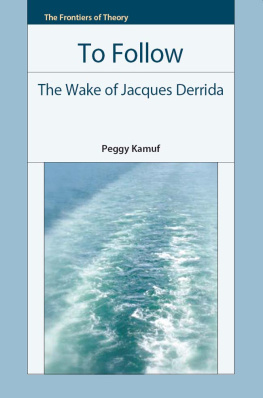

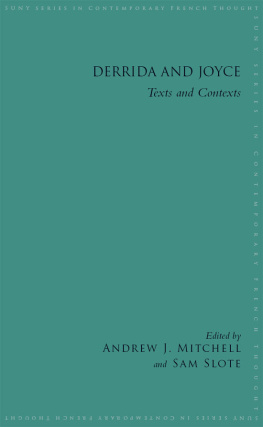
 The paper used in this publication meets the minimum requirements of the American National Standard for Information SciencesPermanence of Paper for Printed
The paper used in this publication meets the minimum requirements of the American National Standard for Information SciencesPermanence of Paper for Printed
